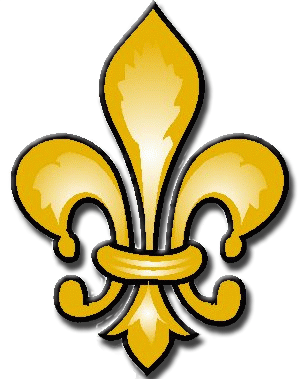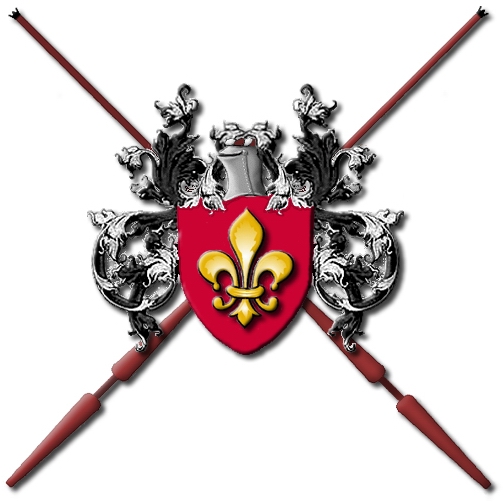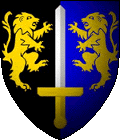
Michael Carroll
Rochester, NYEmail:




|
Michael CarrollRochester, NYEmail: |

|
|
|
||

|

|
|
Portrayal dates (late14th - early 15th C.):
b.1365
d.~1416 (of complications from wounds received at Agincourt)
Michael was born in Northern Ireland, but unfortunately his mother died shortly after his birth so he was sent to live with relatives in Scotland. They very quickly grew tired of feeding him and managed to foster him off to a minor French nobleman (as part of the Auld Alliance) as a page. He later became a squire and was eventually knighted on November 29th, 1382 (at the early age of 17) immediately prior to the Battle of Roosbeke as a reward for bold actions committed during an earlier rout of the Flemish (in particular, for participation in fording the Leie River with 400 French knights.) During the main battle at Roosbeke, he fought under the command of Enguerrand de Coucy on the French left flank. During which time he was so impressed with the leadership and wisdom of deCoucy that he chose to seek his fortune and continue fighting alongside the Armagnacs against the Burgundians throughout the troublesome period to follow. After the Truce of Leulinghen in 1389 he began traveling throughout the continent participating in any tournament he could find, jousting whenever, and wherever possible.
| 1360 | Treaty of Calais between Edward III and Philip of Burgundy. |
| 1361 | Black Death reappears in England. |
| 1362 | English poem "Piers Plowman" written by William Langland. |
| 1363 | Peace of Bretigny, ending the first phase of the war, which has so far
been a draw. Timur the Lame leads Mongol armies to new conquests in Asia, sweeping over northern India. |
| 1364 | Jean II, Charles V becomes king of France (dies in 1380). |
| 1365 | Charles V crowned king of Burgundy at Arles. Vienna University founded. |
| 1366 | English parliament refuses to pay feudal dues to the pope. |
| 1367 | Turks expand their hold on European side of the Dardennales (Constantinople still held by Byzantines). |
| 1368 | Mongols overthrown in China by the Mings. |
| 1369 | The Bastille is built in Paris. |
| 1370 | Steel crossbows developed, more powerful than older wooden ones. |
| 1371 | Robert II becomes king of Scots, first Stewart king. |
| 1372 | French defeat English several times. Welch rebel takes Gurnsey. |
| 1373 | John of Gaunt (younger son of Edward III) leads English army into France via Calais. |
| 1374 | Petrarch dies. |
| 1375 | Treaty of Bruges between England and France. |
| 1376 | Edward, the Black Prince, dies. |
| 1377 | Edward III dies, his grandson Richard II becomes king(deposed, 1399). |
| 1378 | French renew fighting with English. "Great Schism" begins in the Church. |
| 1379 | New College, Oxford, founded. |
| 1380 | Charles V of France dies, Charles VI ("the deranged") becomes king. This is actually the end of the Valois line (and, in effect, the even more ancient Capetian line), as Charles VII was fathered by a boyfriend of Charles VI's wife (she wouldn't say which boyfriend, but Charles VII was a big improvement on the last few Valois kings). |
| 1381 | Wat Tyler led peasants' rebellion in England. |
| 1382 | Wyclif expelled from Oxford for preaching heresy. French defeat Flanders in Battle of Roosebeke |
| 1383 | Turks conquer what is now Bulgaria. |
| 1384 | War between England and Scotland. |
| 1385 | Fighting renewed in France. |
| 1386 | Swiss defeat yet another Austrian army at Sempach. |
| 1387 | Chaucer begins the "Canterbury Tales" (finishes it in 1400, dies soon thereafter.) |
| 1388 | Scots defeat English at Chevy Chase. |
| 1389 | Truce between England, Scotland and France. |
| 1390 | Robert III becomes king of Scotland. |
| 1391 | Wyclif's heretical writings cause formation of first Protestant groups in Bohemia. |
| 1392 | Charles VI of France goes completely mad. Burgundy – Armagnac conflict begins. |
| 1393 | King of Bohemia cracks down on religious "irregularity." |
| 1394 | Richard II invades Ireland. |
| 1395 | Richard II "allegedly "subdues Ireland. |
| 1396 | Richard II marries Isabella of France at Calais. |
| 1397 | Sweden, Denmark, and Norway unite. |
| 1398 | Timur the Lame conquers northern India. |
| 1399 | Richard II deposed, Henry IV (grandson of Edward III through John of Gaunt) becomes king by seizing the English throne |
| 1400 | Henry IV defeats rebellion by English nobles. |
| 1401 | Timur the Lame conquers Baghdad and Syria. |
| 1402 | Timur defeats Turks in Anatolia. |
| 1403 | Henry IV suppresses rebellion in northern England. |
| 1404 | Art and literature flourish in Ming dynasty China. |
| 1405 | Timur the Lame dies (just in time, he was getting awfully close...) |
| 1406 | Robert II of Scotland dies, succeeded by James I who is promptly taken prisoner by the English. |
| 1407 | Louis, Duke of Orleans, murdered by Burgundians, civil war rages in France. |
| 1408 | Cardinals of Rome and Avignon meet to end the "Great Schism" (anti-popes.) Negotiations drag on for years. |
| 1409 | Leipzig University founded. |
| 1410 | Heretic (or First Protestant, if you will) Jan Hus and his followers (the "Hussites")are excommunicated in Prague. |
| 1411 | Sigismund, King of Hungary, elected Holy Roman Emperor. |
| 1412 | Joan of Arc born. |
| 1413 | Henry IV dies, Henry V becomes king of England (until 1422.) |
| 1414 | The Medici of Florence become bankers to the Papacy. |
| 1415 | Jan Hus burned at the stake for Heresy. Battle of Agincourt. |
| 1416 | Dutch fishermen begin to use drift nets, making fishing much more efficient and profitable. Beginning of Dutch rise to commercial prominence in the region. |
| 1417 | Pope Martin V elected, end of the Great Schism (anti-popes). |
| 1418 | Henry V rampages through France, many French cities fall. |
| 1419 | Henry V allies with Burgundians against the French king. |
| 1420 | Treaty of Troyes, Charles VI ("the deranged") recognizes Henry V as his heir and gives him his daughter as Henry V's wife. |
| 1421 | Hussite wars rage in Bohemia, Hussites are winning. |
| 1422 | Henry V dies, succeeded by his nine month old son, Henry
VI. Charles VI dies, many French nobles recognize son of Charles VI as real French king (Charles VII.) |
| 1423 | English release King James I of Scotland. |
| 1424 | Bohemia in flames, as Hussites fight Imperial troops, and each other. |
| 1425 | John VIII becomes Byzantine emperor, last chance to save Byzantium. |
| 1426 | Holland becomes center of European music. |
| 1427 | Itzcoatl, king of the Aztecs, begins conquest of neighbors and establishment of an empire. |
| 1428 | Joan of Arc begins to lead French troops against the English. |
| 1429 | Joan of Arc raises English siege of Orleans. Charles VII crowned king of France in Rheims. Child king Henry VI crowned at Westminster. |
| 1430 | Joan of Arc captured by Burgundians. Modern English becomes a noticeable evolution of Middle English as common form of spoken English. |
| 1431 | Joan of Arc burned at the stake for heresy. Henry VI crowned king of France in Paris (he's nine years old and, boy, has he got problems.) |